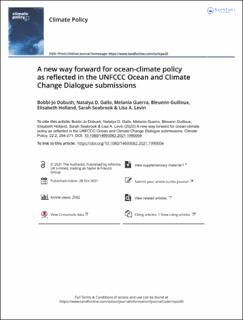| dc.contributor.author | Dobush, Bobbi-Jo | |
| dc.contributor.author | Gallo, Natalya | |
| dc.contributor.author | Guerra, Melania | |
| dc.contributor.author | Guilloux, Bleuenn | |
| dc.contributor.author | Holland, Elisabeth Ann | |
| dc.contributor.author | Seabrook, Sarah | |
| dc.contributor.author | Levin, Lisa A. | |
| dc.date.accessioned | 2022-04-07T08:42:25Z | |
| dc.date.available | 2022-04-07T08:42:25Z | |
| dc.date.created | 2021-11-15T14:54:21Z | |
| dc.date.issued | 2022 | |
| dc.identifier.issn | 1469-3062 | |
| dc.identifier.uri | https://hdl.handle.net/11250/2990417 | |
| dc.description.abstract | The ocean plays a central role in climate change mitigation and adaptation. However, climate and ocean policies have been historically siloed. After decades of slow convergence, the Ocean and Climate Change Dialogue, decided at COP25 and launched online in December 2020, was the first forum for Parties and non-Party stakeholders to the UNFCCC to give their perspectives on how the climate regime should address ocean-related mitigation and adaptation. The Ocean Dialogue was informed by 47 prior open submissions provided by a broad swath of actors from across the UN system and from civil society, including traditional and youth voices. Our analysis of the submissions demonstrates a political evolution towards the nexus among climate, ocean, and biodiversity regimes. The submissions uniformly acknowledge that ocean and climate systems are inextricably linked, and that consideration of ocean-based action will strengthen climate action and vice versa. Salient themes of the submissions include changing ocean impacts, carbon sinks and blue carbon opportunities, and the need for ecosystem resilience, biodiversity management and improved understanding of normative and institutional frameworks. There is a strong call to recognize the interconnectedness of the biophysical world. Similar themes emerged during the actual Ocean Dialogue and the subsequent informal meeting on next steps. The main message conveyed is the dire necessity to implement strong stewardship and good governance of the blue planet in a disrupted climate using cooperative and concrete actions. This analysis highlights the need for a continued transdisciplinary international dialogue on the ocean and climate change which elevates the ocean-climate-biodiversity nexus via collaborative science, finance, and policy. | en_US |
| dc.language.iso | eng | en_US |
| dc.publisher | Taylor & Francis | en_US |
| dc.rights | Attribution-NonCommercial-NoDerivatives 4.0 Internasjonal | * |
| dc.rights.uri | http://creativecommons.org/licenses/by-nc-nd/4.0/deed.no | * |
| dc.title | A new way forward for ocean-climate policy as reflected in the UNFCCC Ocean and Climate Change Dialogue submissions | en_US |
| dc.type | Journal article | en_US |
| dc.type | Peer reviewed | en_US |
| dc.description.version | publishedVersion | en_US |
| dc.rights.holder | Copyright 2021 The Author(s) | en_US |
| dc.source.articlenumber | 254-271 | en_US |
| cristin.ispublished | true | |
| cristin.fulltext | original | |
| cristin.qualitycode | 1 | |
| dc.identifier.doi | 10.1080/14693062.2021.1990004 | |
| dc.identifier.cristin | 1954760 | |
| dc.source.journal | Climate Policy | en_US |
| dc.identifier.citation | Climate Policy. 2022, 22 (2), 254-271. | en_US |
| dc.source.volume | 22 | en_US |
| dc.source.issue | 2 | en_US |

